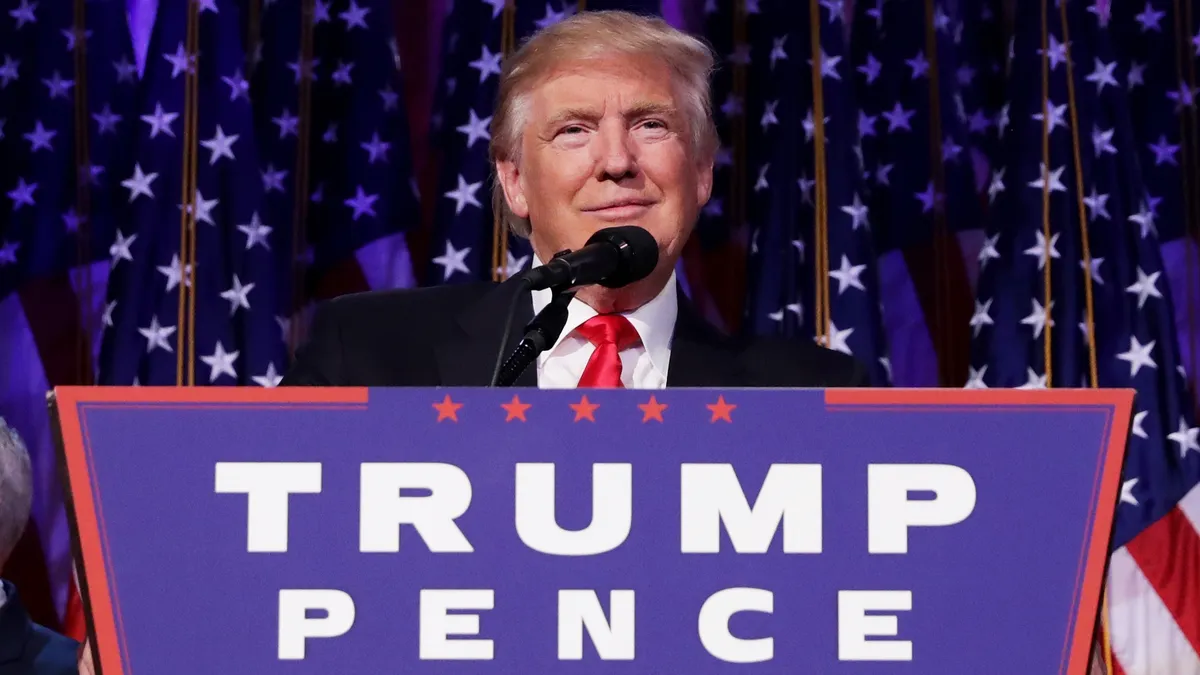Dive Brief:
- President Trump announced the U.S. will exit the Paris climate accord in a speech in the White House Rose Garden on Thursday.
- Trump said the pact, signed by 195 nations at the end of 2015, is "bad deal for Americans" that "disadvantages the United States at the exclusive advantage of other countries." The accord aims to limit global warming to 2°C this century, translating into an 80% economywide decarbonization for the U.S. by 2050.
- Trump said the U.S. would "start to negotiate" a new accord or reentry into the Paris agreement, implying the country will remain in the underlying treaty, the United Nations Framework Convention on Climate Change. That would initiate a lengthy Paris withdrawal process expected to take until at least November 2020 to finalize.
Dive Insight:
Speaking from the Rose Garden on Thursday, Trump said the U.S. would immediately end " implementation of the nationally determined contribution [to emissions reduction] and, very importantly, the green climate fund which is costing the United States a vast fortune."
"I was elected to serve the citizens of Pittsburgh, not Paris," Trump said.
The decision puts an end to months of waiting, as the White House delayed a final decision on the Paris accord multiple times while advisers debated the merits of the international treaty.
Trump said the "badly negotiated" accord would cost the U.S. economy 2.7 million jobs by 2025, citing a study from NERA Economic Consulting criticised by clean energy advocates for assessing a decarbonization pathway that is unrealistic and unnecessarily costly.
He also blamed the agreement for not allowing the U.S. to build new coal plants, while other nations are permitted to do so. All commitments under the Paris accord, however, are voluntary, and U.S. utilities are unlikely to build coal plants even without agreement.
The president also pointed out that the U.S. has already cut its carbon emissions in recent years, with economywide CO2 emissions declining 12% since 2006.
Those declines are set to stagnate, however, if Trump succeeds in rolling back domestic climate protections. The administration is currently reviewing the Clean Power Plan, which governed emissions from existing generators, as well as a companion rule for new plants and other clean air protections from the Obama administration.
Without those rules, the Rhodium Group forecasts the U.S. will fall far short of the near-term goals of the Paris accord, which aims for a 26%-28% reduction in emissions from the U.S. by 2025.
Due to those domestic rollbacks, the immediate impact of Paris withdrawal on U.S. utilities is expected to be minimal.
"Withdrawing from Paris will have no effect on the policy landscape for U.S. utilities," said Jesse Jenkins, an energy researcher at MIT. "State-level policies likewise will continue apace, as will efforts by municipalities and businesses to accelerate the transition to clean energy."
The more meaningful impact, Jenkins said, would be on America's position as a leader on climate change, forged by President Obama through his domestic climate policies and active role in negotiating the Paris pact.
"What Paris gave us was a strong framework to bridge the collective action challenge and jointly work with other nations to ratchet up ambition on climate mitigation over time," Jenkins said. "President Trump is walking away from that opportunity."
That perspective was common in the days leading up to the withdrawal announcement. Former U.N. Ambassador Samantha Power embodied the dismay of many when she tweeted that a Paris exit would mean "the end of the American Century."
But getting out of the Paris accord is no quick operation. Due to a complicated withdrawal procedure, the U.S. could not leave the pact until November 2020 — the month of Trump's next presidential election, should he be the Republican nominee. Already this week, European leaders stressed they would not look to ease the withdrawal process.
“This notion, ‘I am Trump, I am American, America first and I am getting out,’ that is not going to happen," Jean-Claude Juncker, president of the European Commission, told the AP.
The president's decision, reported by various media outlets throughout the week, has already sparked criticism from clean energy groups, business associations and the international community. But some conservatives and free market advocates lauded the move.
Others think the Paris accord will be better off without the U.S. Writing in Nature, Australian environmental professor Luke Kemp argues that allowing the U.S. to stay in the accord while gutting domestic climate protections would weaken the pact.














